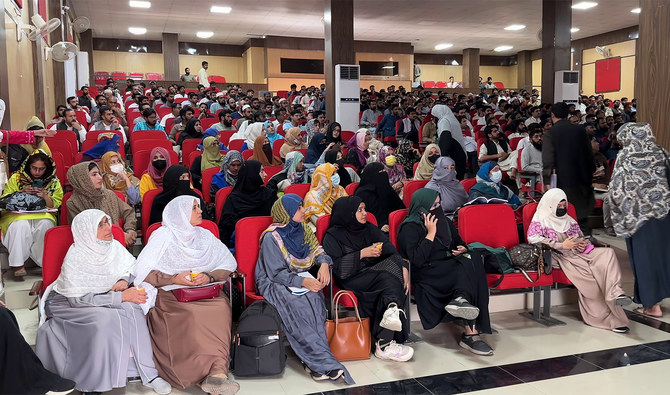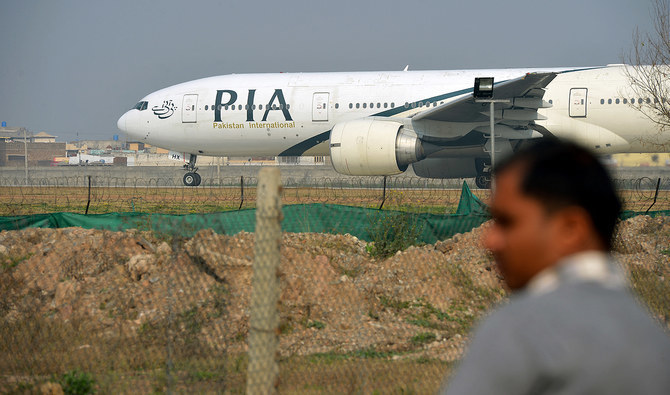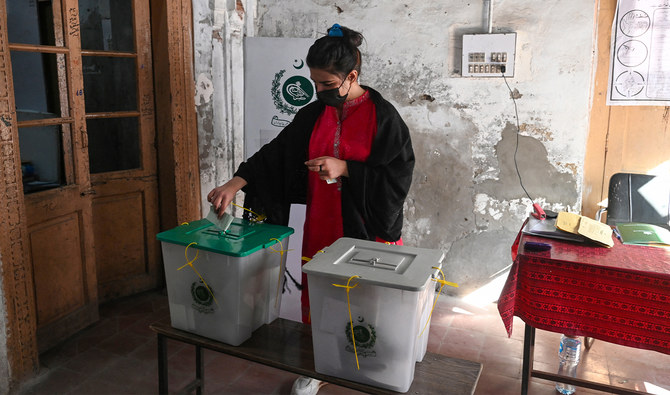ISLAMABAD: Federal Minister for Finance Asad Umar said that Pakistan is likely to receive the first tranche of $1 billion under the balance of payments support from Saudi Arabia on Monday, the Pakistan media reported.
The amount of the first tranche will reach the State Bank of Pakistan (SBP), according to the Finance Minister.
Umar added that the second and third tranche will be received over the next two months.
In October, Prime Minister Imran Khan visited Saudi Arabia and the kingdom agreed to give a bailout plan of $6 billion for Pakistan under which Saudi Arabia agreed to hand over $3 billion to Pakistan “as balance of payment support,” while another one-year deferred payment facility of up to $3 billion for oil imports was agreed.
Umar reiterated that Saudi Arabia is taking a keen interest in investments in different projects in the Gwadar Port.
Last week in a meeting with President Arif Alvi, Saudi Ambassador to Pakistan Nawaf bin Said Al-Malki revealed that “Saudi Minister for Energy will soon visit Pakistan to sign MoU on establishing an oil refinery in Pakistan, apart from finalizing other major projects in which Saudi Arabia has shown interest,” President office said in a statement after the meeting on November 06.
Since assuming office in August this year, Prime Minister Imran Khan visited Saudi Arabia twice and Pakistani leadership terms these trips very successful, resulting in enhanced and multi-faceted economic cooperation between the two brotherly countries.
Prime Minister Imran Khan and his economic team are also in talks with China for financial backing and PM Khan early this month visited China.
Pakistan is also holding talks with International Monitory Fund (IMF) for another loan to meet the economic challenges.
Pakistan likely to receive first tranche of $1bn from KSA today
Pakistan likely to receive first tranche of $1bn from KSA today

- Saudi Arabia pledged $6 billion financial bailout package for Pakistan in October
- The remaining amount will be received in the next two months
Pakistan trains hundreds of volunteers ahead of annual Hajj pilgrimage

- Hajj is one of the five pillars of Islam and every adult Muslim is required to undertake it at least once in their lifetime
- Islamabad is to begin its Hajj flight operation from May 9 that would conclude on June 9 and facilitate over 63,000 pilgrims
ISLAMABAD: The Pakistani government has started training hundreds of volunteers ahead of the annual Hajj pilgrimage to help thousands of pilgrims overcome language barrier and other challenges in Saudi Arabia, besides imparting training to intending pilgrims on how to perform Hajj rituals.
Pakistan has a Hajj quota of 179,210 pilgrims this year. Of them, 63,805 pilgrims will be performing the pilgrimage under the government scheme, while the rest would be accommodated by private tour operators, according to the Pakistani religious affairs ministry. The South Asian country is set to start its Hajj flight operation on May 9, which would conclude on June 9.
The ministry conducts training of Hajj assistants and pilgrims every year ahead of their departure to Saudi Arabia to make sure the whole process, including their food, transportation and accommodation, is managed efficiently. This year, Pakistan will be sending 550 Hajj assistants and 400 doctors and paramedical staff to Saudi Arabia to facilitate the pilgrims.
“The training programs are currently underway at district and tehsil level and Islamabad is one of them,” Noor Muhammad Soomro, a deputy director at the Hajj directorate in Islamabad, told Arab News.
“Ministry of Religious Affairs has made very good arrangements for the pilgrims, and this includes Pak Hajj app. If a pilgrim uses the Pak Hajj app, he gets all the details, including training, vaccination, maps.”
Soomro said each Pakistani pilgrim would be provided with a SIM card having a 7GB data to connect with their families back home.
“This time, we will provide the train facility to all those pilgrims who travel to Saudi Arabia on the government scheme in Mina, Arafat and Muzdalifah,” he said.
Hajj is an annual Islamic pilgrimage that has been in practice for over 1,400 years. It is one of the five pillars of Islam, and requires every adult Muslim to undertake the journey to the holy Islamic sites in Makkah at least once in their lifetime, if they are financially and physically able. This year’s pilgrimage is expected to run from June 14 till June 19.
Instructors have been training Hajj assistants and intending pilgrims at a sprawling auditorium at the Islamabad Hajji Camp, where they can also visit different stalls to purchase Hajj items like Ihram, umbrella and towels.
“This training is basically the introduction of the duties of Hajj,” Sanober Khaliq Baloch, a Hajj assistant, told Arab News. “Hajj assistants would be performing those duties for example the induction [of the pilgrims], the transport, the food and obviously about Mina map, a little about the roads and traveling, all these things.”
Speaking about the potential challenges, she said the temperature difference and up to 14 hours of duty could be “daunting,” but she was determined to facilitate the pilgrims in all possible way.
Faisal Hafeez, another Hajj assistant, said he was committed to serve the pilgrims well by taking care of their food, accommodation and transportation.
“Different problems that confront the pilgrims have been discussed here [during the training] and how we are supposed to deal with them and solve the problems,” he told Arab News.
Syeda Munir, who is going to perform Hajj for the first time, praised the training sessions, saying this would help them smoothly perform all rituals.
“This is my third [training] session,” she told Arab News. “They guide us well about how to perform Umrah and Hajj.”
Global airline body calls for release of $720 million in held revenues by Pakistan, Bangladesh

- IATA asks Pakistan in a statement to simplify the ‘onerous’ repatriation process causing ‘unnecessary delays’
- The international organization says airlines are unable to repatriate $399 million from the Pakistani market alone
KARACHI: The International Air Transport Association (IATA) on Wednesday asked Pakistan and Bangladesh to release airline revenues amounting to $720 million, saying the two countries were holding it in contravention of international agreements.
IATA, an international organization representing the global airline industry, asked Pakistan to simplify the “onerous” repatriation process involving audit and tax exemption certificates in a statement, pointing out such procedures caused “unnecessary delays.”
Bangladesh, it said, had a more standardized system, though aviation needed to be a higher central bank priority to facilitate access to foreign exchange.
“The situation has become severe with airlines unable to repatriate over $720 million ($399 million in Pakistan and $323 million in Bangladesh) of revenues earned in these markets,” the statement informed.
IATA’s regional vice president for Asia-Pacific Philip Goh emphasized that the timely repatriation of revenues to different countries was critical for payment of dollar denominated expenses such as lease agreements, spare parts, overflight fees and fuel.
“Delaying repatriation contravenes international obligations written into bilateral agreements and increases exchange rate risks for airlines,” he said. “Pakistan and Bangladesh must release the more than $720 million that they are blocking with immediate effect so that airlines can continue to efficiently provide the air connectivity on which both these economies rely.”
Goh maintained that his organization recognized the two governments were facing difficult challenges, making it necessary for them to determine how to utilize foreign currencies strategically.
“Airlines operate on razor-thin margins,” he continued. “They need to prioritize the markets they serve based on the confidence they have in being able to pay their expenses with revenues that are remitted in a timely and efficient fashion.”
He pointed out reduced air connectivity limited the potential for economic growth, foreign investment and exports, adding such large sums of money involved in the Pakistani and Bangladeshi markets necessitated urgent solutions.
Pakistan Stock Exchange hits record high, breaks 72,000 points in intraday trade

- Analysts say investors expect a significant decline in April inflation data that may lead to a cut in interest rates
- The Pakistani bourse has recently been trading at record highs due to hopes of positive loan talks with the IMF
ISLAMABAD: Pakistan’s benchmark share index breached the key level of 72,000 to trade at a record high of 72,414 points during intraday trade earlier on Wednesday, according to data from the Pakistan Stock Exchange website.
The Pakistani bourse has recently been trading at record highs amid positive sentiment prevailing among investors due to hopes of the country’s successful talks with the International Monetary Fund (IMF) for a new loan program.
The country’s finance minister, Muhammad Aurangzeb, recently visited Washington to hold talks with IMF officials for a long-term bailout facility as Pakistan’s current $3 billion program is due to expire this month.
The finance minister expressed hopes the outline of the new program would soon become visible, adding that the loan would help Pakistan continue with structural economic reforms.
“After a record current account surplus, investors are now expecting a big fall in April inflation data that may result in a cut in interest rates in the coming months,” Sohail Mohammed, CEO of Karachi-based brokerage company Topline Securities, told Reuters.
Pakistan’s benchmark KSE100 index has surged 75.5 percent over the past year and is up 11.5 percent year-to-date.
The equity market is expected to surge further as an IMF delegation arrives in Pakistan next month to determine the contours of the new loan facility.
“We are still hoping that we can get into a staff-level agreement [with the IMF] by the time June is done or early July so that we can move on,” the finance minister said on Tuesday while addressing a news conference in Islamabad.
With input from Reuters
Matthews’ second century powers West Indies Women to convincing 88-run victory over Pakistan

- The victory in the third ODI helps West Indies sweep the ICC Women’s Championship fixer by 3-0
- The two teams are now scheduled to play five Twenty20 cricket matches in Karachi from Friday
ISLAMABAD: West Indies Women’s captain Hayley Matthews scored her second century of the series to help her team convincingly beat Pakistan Women by 88 runs in the third One-Day International (ODI) in Karachi and sweep the International Cricket Council’s (ICC) Women’s Championship 2022-25 fixture by 3-0.
Matthews, who scored 140 not out in the series opener five days ago, made an excellent 141 to steer her side to 278 for six in 50 overs. Pakistan Women, in their run-chase, faltered to 190 all-out in 47.5 overs.
Matthews faced 149 balls and struck 19 fours in her career-best innings in 83 matches. She put on 93 runs in 110 balls for the second wicket with Shemaine Campbelle and 111 runs for the third wicket in 124 balls with Stafanie Taylor. She was the fifth batter to be dismissed at the score of 250 in the 46th over.
“West Indies win the third and final ODI of the series by 88 runs,” the Pakistan Cricket Board (PCB) announced in a social media post.
Campbelle contributed a 58-ball 38 with two fours, while Taylor followed up on her 73 in the previous match with a 62-ball 47 including four fours. Later in the order, Aaliyah Alleyne struck three fours in a 12-ball 20 not out to put West Indies Women in a position of strength.
For Pakistan Women, Nashra Sandhu was the most successful bowler with three wickets for 54 runs, while Fatima Sana snapped up two wickets for 67 runs.
In their run-chase, Pakistan Women were formally out of contention after losing half their side for 95 runs in 27.2 overs. Aaliya Riaz (36) and Fatima Sana (23) delayed the inevitable by adding 41 runs in 63 balls for the sixth wicket, before the home side were sent packing for 190 with 13 deliveries of their quota remaining.
Muneeba Ali top-scored with 38, while Bismah Maroof contributed 19 as the two batters added 45 runs for the third wicket.
For the West Indies Women, Aaliyah Alleyne grabbed two wickets for 10 runs, Hayley Matthews picked up two wickets for 26 runs, and Stafanie Taylor bagged two wickets for 29 runs.
After seven rounds of the ICC Women’s Championship 2022-25, Pakistan have remained in fifth position on 16 points with eight wins and 13 losses. In contrast, the West Indies have moved ahead of Bangladesh and joined Sri Lanka in seventh position on 14 points (six wins, seven losses) after five rounds.
The top five teams in the 10-team ICC Women’s Championship 2022-25, along with hosts India, will directly qualify for the ICC Women’s Cricket World Cup 2025. The bottom four teams of the ICC Women’s Championship 2022-25 and the top two teams from the ICC ODI rankings will progress to a Women’s Cricket World Cup Qualifier tournament.
The two sides will now go toe to toe in the five-T20I series, which will be played at the National Bank Stadium on 26 April, 28 April, 30 April, 2 May, and 3 May. The matches will commence at 7.30 pm.
Pakistan’s independent election monitor says by-poll irregularities overshadowed improved result management

- FAFEN says its observers were stopped from monitoring elections at 19 polling stations in two Punjab constituencies
- It mentions a decline in the number of votes cast despite an overall increase in registered voters since February 8
ISLAMABAD: An independent election monitoring network in Pakistan highlighted low voter turnout and procedural irregularities in provincial constituencies in Punjab on Tuesday, saying such teething issues dominated improved result management in the by-polls held on April 21.
Established in 2006, the Free and Fair Election Network (FAFEN) aims to promote electoral transparency, integrity and fairness in Pakistan through citizen observation and advocacy efforts.
It operates independently, monitoring various aspects of the electoral process, including voter registration, polling procedures and result tabulation to ensure impartial elections in the country.
“Low voter turnout, procedural irregularities and restrictions on independent observation in two provincial constituencies in Punjab overshadowed the improved results management and lower numbers of ballots excluded from the count during April 21 elections in 22 national and provincial assembly constituencies,” FAFEN said in its report on by-elections.
“Polling station establishment, voter identification, and counting at polling stations were observed to have been largely compliant with law and procedures,” it continued. “However, instances of omissions in ballot issuance requirements by Assistant Presiding Officers (APOs) were reported from around 14 percent of the observed polling stations.”
FAFEN said while polling agents and accredited observers could generally access voting and counting process, security officials or Presiding Officers barred its observers at 19 polling stations in PP-36 Wazirabad and PP-22 Chakwal-cum-Talagang.
“In PP-22, the accreditation process of FAFEN observers was also delayed until the midday on the polling day causing last-minute changes in the observation scope,” it added.
The report said nearly 36 percent of registered voters cast their votes on polling day, which was nine percent less than the turnout in 18 of these constituencies on February 8.
Votes polled by women decreased by 12 percent, while votes polled by men declined by nine percent, despite an increase of 75,640 registered voters, including 37,684 men and 37,956 women compared to the general elections.
“Lahore’s five constituencies recorded the sharpest decline in the voter turnout with PP-147 reporting a mere 14 percent as against 35 percent on February 8,” it noted. “Similarly, NA-119 Lahore registered a 19 percent turnout against 39 percent on February 8. However, the voter turnout in Gujrat and Khuzdar constituencies recorded an increase compared to general elections.”
FAFEN said it deployed 259 Election-Day observers, including 187 men and 72 women, to observe the voting and counting processes at 1,036 polling stations in five National Assembly and 17 Provincial Assembly constituencies in Punjab, Balochistan and Khyber Pakhtunkhwa provinces.
It said that its report was based on the observations received on Election Day from 532 polling stations through FAFEN Election Day Observation mobile application.









